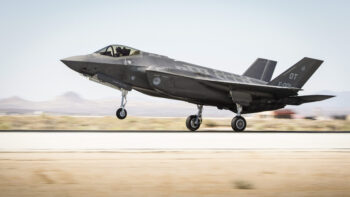
Marines with Marine Corps Forces Cyberspace Command pose for photos in cyber operations room at Lasswell Hall aboard Fort Meade, Maryland, Feb. 5, 2020. (Via DVIDS)
AUSA: In the face of bold claims by a former senior Air Force official that the United States has “no competing fighting chance” against the Chinese military, the Army’s CIO rejected the idea when asked about it here.
“We have no competing fighting chance against China in 15 to 20 years. Right now, it’s already a done deal; it is already over in my opinion,” the former first chief software officer of the Air Force, Nicolas Chaillan, in an interview with the Financial Times.
Chaillan told the FT that the US failure to tackle Chinese advances in artificial intelligence, machine learning, and cyber capabilities was “putting his children’s future at risk.” Some US cyber defense efforts were, he said, at “kindergarten level.” (Chaillan later took to social media to say he “never said [the US] lost” already, but would if it didn’t take action.)
“It’s absolutely not true,” the Army CIO, Raj Iyer, said, rejecting Chaillan’s assessment.
He pointed to the Pentagon’s “tight integration” with industry and “our coalition partners.” The US and its partners share “trade intelligence information and other things,” helping both sides.
“I can tell you the Chinese don’t have that. They’re operating in a vacuum, and they’re relying on nefarious methods and cyberattacks to be able to get to, you know, what they think they know that we have,” he said.
RELATED: To Aid Digital Transformation, Army Eyes ‘One Cloud’ And Faster Acquisition
There is one area where Iyer said the Chinese do excel in: the actual use of AI. “They do a really good job of maintaining control people using AI. Obviously, we don’t do that in United States, but if you looked at both what we have in the Department of Defense and Intelligence Community, across the federal government and our industrial partners, we have the best AI technology.”

Chinese hackers publicly named as suspects by the FBI
More broadly, the RAND Corp. issued a report today, coincidentally, saying that Russia and China combined will “approach, but not exceed” US power through the next year.
The authors project that “China’s relative share of power will increase relative to the United States and Russia at least through 2022 and that aggregate Chinese and Russian power will continue to approach, but not exceed, U.S. power through 2022.”
Such a prediction to 2022, only a few months away, may not be very illustrative of farther down the road. RAND’s authors said, “We do not attempt to project our military and technology indexes beyond 2022 because linear projections could become increasingly misleading. However, based on the longer-term economic projections […], we expect China’s economic capacity to level out after 2030, which could mean that whatever U.S. advantage remains (if any) at that point could persist as China’s economic growth slows.”
But all is not sweetness and light, as anyone who read the report of the National Security Commission on Artificial Intelligence knows. It says: “China possesses the might, talent, and ambition to surpass the United States as the world’s leader in AI in the next decade if current trends do not change.”
Of course, that doesn’t mean they will.






















